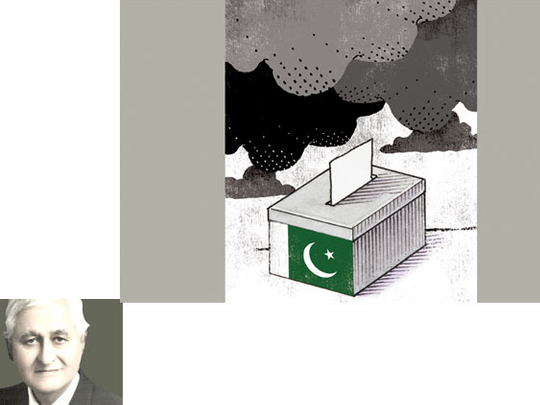
With the Pakistan general election set for May 11, campaigning is at its peak. The questions in the minds of the electorate and observers abroad are: Will the elections take place on time given the targeted attacks by the Tehrik-e-Taliban Pakistan (TTP)?
More than 60 people have been killed in attacks since April 11, including Chaudhry Zulfikar Ali, the lead prosecutor in the Benazir Bhutto assassination case. He was gunned down on Friday. What will the electoral outcome be and what challenges lie ahead for the post-poll dispensation?
The attacks and loss of valuable life though largely confined to areas outside Punjab — Pakistan’s largest province — have certainly had an effect. However, it has not dented enthusiasm for the elections. The interim government backed by the judiciary and the military has pledged to hold elections on time. It would take a catastrophic event to alter the status quo and and that remains improbable.
The violence, however, will affect voter turnout. It is generally held that a low turnout — around 43-45 per cent — would go against Imran Khan’s Pakistan Tehrik-e-Insaaf (PTI) in what is basically a three-party race with the ruling Pakistan Peoples Party and Nawaz Sharif’s Pakistan Muslim League (Nawaz) being the other contenders. The expectation is that a high voter turnout would favour the PTI given its young and educated voter base.
There are certain political realities: The following of the two main parties, the PPP and the PML(N) and those of parties such as the Muttahida Qaumi Movement (MQM) in urban Sindh, the Awami National Party (ANP) in Khyber Pakhtunkhwa province and the religious parties such as the Jamaat-e-Islami and the Jamaat-e-Ulema Islami, the appeal of their leaders, the local electables and the prevalence of the biradari or clan system.
Emerging contours
To analysts of Pakistan’s political scene, certain contours seem to be emerging. The PPP has the disadvantage of having been in power when inflation has risen, energy shortages have depressed the economy and law and order has deteriorated. No prominent leader is marshalling its campaign. The PPP can complain with some justification that there has been a global recession, that law and order is a provincial responsibility of the PML(N) in Punjab, and that being buffeted by the courts and opponents has not allowed them to carry out their plans in peace.
The common man, however, cannot see beyond his everyday problems.
In central Punjab, the advantage seems to lie with the incumbent provincial government — the PML-N. However, in south Punjab, the PPP retains more influence and will certainly get a majority in Sindh with the MQM retaining the seats in its urban strongholds. The PML-N has entered into alliances in provinces outside Punjab, but in Khyber Pakhtunkhwa, apart from the Hazara district, it may not significantly dent regional parties led by the ANP.
The PPP has a following in pockets in both Khyber Pakhtunkhwa and Balochistan. In Balochistan, electoral results will most likely return a fractured house as was the case in the last elections.
The impact of Khan’s PTI and whose vote bank it will deplete is the big question. However, whatever the strength of the PTI’s call for change and no matter how well it performs, it is unlikely to have the seats to form a government on its own.
While the shape of any coalition will depend on the results, political bargaining and accommodation of diverse interests, one aspect is crystal clear. The new government will be confronted by multiple challenges. The key will be to get the economy going to generate resources to tackle law and order, improve education, rebuild infrastructure and improve social services.
The fulcrum will be tackling the energy crisis by improving management and distribution, improving energy efficiency as China has done, getting stalled and long-delayed projects such as the gas pipeline from Iran, an LNG terminal and state-to-state agreement with Qatar.
There are foreign policy challenges — foremost enhancing relations with America beyond 2014 and managing relations with India and Afghanistan, never easy at the best of times, in order to make space for internal priorities.
The economy is the priority. A strong and stable Pakistan will make for the best dynamics to face the external world.
Ambassador Tariq Osman Hyder is a former Pakistani diplomat.












